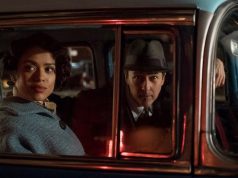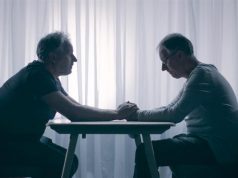Some documentaries are investigative, using new research to uncover hidden truths. Others serve as news digests, simply compiling facts that are already out there. “The U.S. vs. John Lennon” falls under the latter category. Produced by VH1, it has a “Behind the Music” feel to it — clips, music, talking heads, the whole nine yards — and is essentially a history lesson on John Lennon’s post-Beatles years.
If you’re a fan, you probably already know a lot of the basics. But then, if you’re a fan, you’ll be delighted to hear so much of Lennon’s music and see so much footage of the man himself circa 1970. For viewers with only a passing interest in Lennon’s doings, the film, directed by TV music-doc veterans David Leaf and John Scheinfeld, never fails to engage. It’s well-paced and chock-full of interesting tidbits.
Lennon was one of the world’s biggest celebrities during the Beatles’ reign, and his star didn’t dim much after the group broke up in 1970. Always outspoken — it was he who remarked on the Beatles’ popularity relative to that of Jesus back in 1966 — Yoko Ono’s influence led him to become even more interested in political activism and the anti-war effort.
The film concentrates first on the peace movement in general, offering useful background on the mood of the late ’60s and early ’70s and how Lennon became attracted to it. From there we see many of Lennon and Ono’s publicity stunts and “performance art” pieces, with an impressive amount of Lennon/Ono footage from that era sprinkled throughout.
And then we delve into the more sinister story of how Lennon and Ono almost got deported in 1972 thanks to Nixon’s interference. Ol’ Dick was a paranoid fellow, as you know, and he had J. Edgar Hoover’s FBI keeping tabs on anyone who was radical and had a sizable following. This included Lennon, who — as any sane person knows — had no intention of doing anything illegal or violent with regard to his anti-war sentiments. But with the voting age lowered in time for the 1972 election, Nixon had a huge number of 18-21-year-olds to pay attention to all of a sudden. And that demographic was listening to Lennon, not Nixon.
New interviews with Ono, G. Gordon Liddy, Walter Cronkite and Gore Vidal, among others, offer insight into what America was like at that time. Liddy comes across as a remarkably compassionless jackass, blaming the victims of the 1970 Kent State shootings for their own demise and continuing, 35 years later, to take the Nixon party line on Lennon’s “threat” to America. Even if you’re too young to remember it, you can see why Lennon and others were so riled up back then.
One line from Vidal compares Nixon’s paranoid administration to a certain Republican administration of the 21st century. It’s too bad that part was included — not because it’s not a viable parallel, but because it politicizes a film that is otherwise purely historical. I say it’s better to leave any possible connections to modern-day politics unspoken and let the movie remain an unalloyed stroll through the turbulent, crazy days of post-Beatles America.
B (1 hr., 33 min.; )





